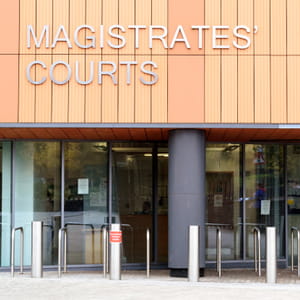
BACKGROUND: An emergency medicine specialist trainee – Dr F – attends a woman with a bruised face and scalp laceration. She is accompanied by a police officer and has alleged assault by her ex-partner – having been punched and slammed against a door. Dr F examines the patient and notes no neurological defect or sign of serious injury. He treats the laceration with tissue adhesives and she is discharged with a diagnosis of minor head injury and advised to return should she suffer further symptoms.
Two weeks later Dr F is approached by police to give a witness statement with patient consent. He provides an account of his examination and treatment of the woman’s injuries based on his clinical notes. A few months later he receives a letter from the crown prosecution service stating that he is required to attend magistrates' court to provide evidence in a case of assault by beating.
Dr F contacts MDDUS to ask for advice on the need for legal support or representation in court.
ANALYSIS/OUTCOME: A medico-legal adviser replies by email confirming that MDDUS would not be allowed to accompany Dr F as we would have no role or locus to do so. He advises Dr F that he will be appearing simply as a witness to fact and therefore should prepare by being familiar with his statement and having the relevant medical records to hand.
Dr F is also advised to ask the police to provide the patient’s consent for him to give evidence. Should consent not be forthcoming then he should flag this to the chair of the magistrate who should then direct him accordingly.
Advice is provided to Dr F including:
- Ensure you know where and when you are going to court and that you arrive in good time.
- Dress professionally.
- Take something to keep yourself occupied (book or newspaper) as you may have to wait before giving evidence.
- Give evidence only in response to questions and try to keep your answers short and concise – even if just “yes”, “no” or “don’t know” as you will be asked for more detail if needed.
- Do not be afraid to ask for clarification from the questioner.
- Remember not to stray beyond your level of experience and expertise when discussing medical findings.
- Take time in answering questions and refer to your notes as necessary.
- Stop talking once you have answered a question to your satisfaction.
- Speak slowly and clearly so that you can be heard and understood.
KEY POINTS
- Doctors and dentists can be compelled to give evidence as witnesses to fact.
- Restrict your evidence to medical findings or the facts of the case.
- Keep within your level of experience and knowledge.
This page was correct at the time of publication. Any guidance is intended as general guidance for members only. If you are a member and need specific advice relating to your own circumstances, please contact one of our advisers.
Save this article
Save this article to a list of favourite articles which members can access in their account.
Save to library